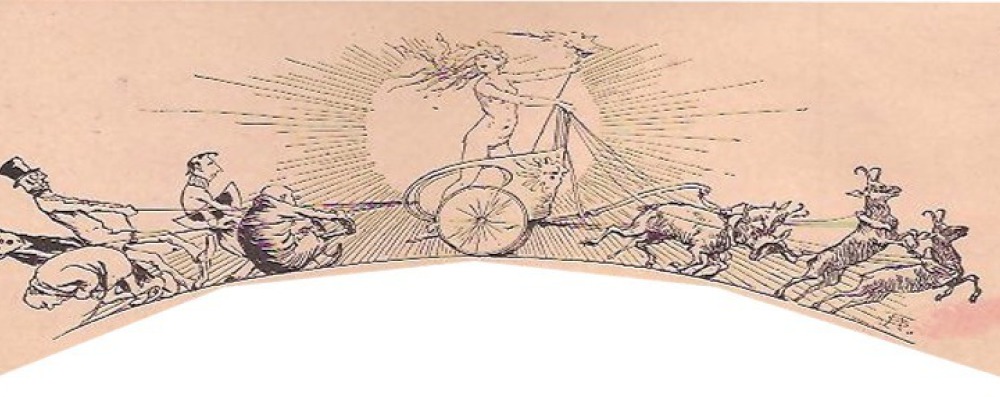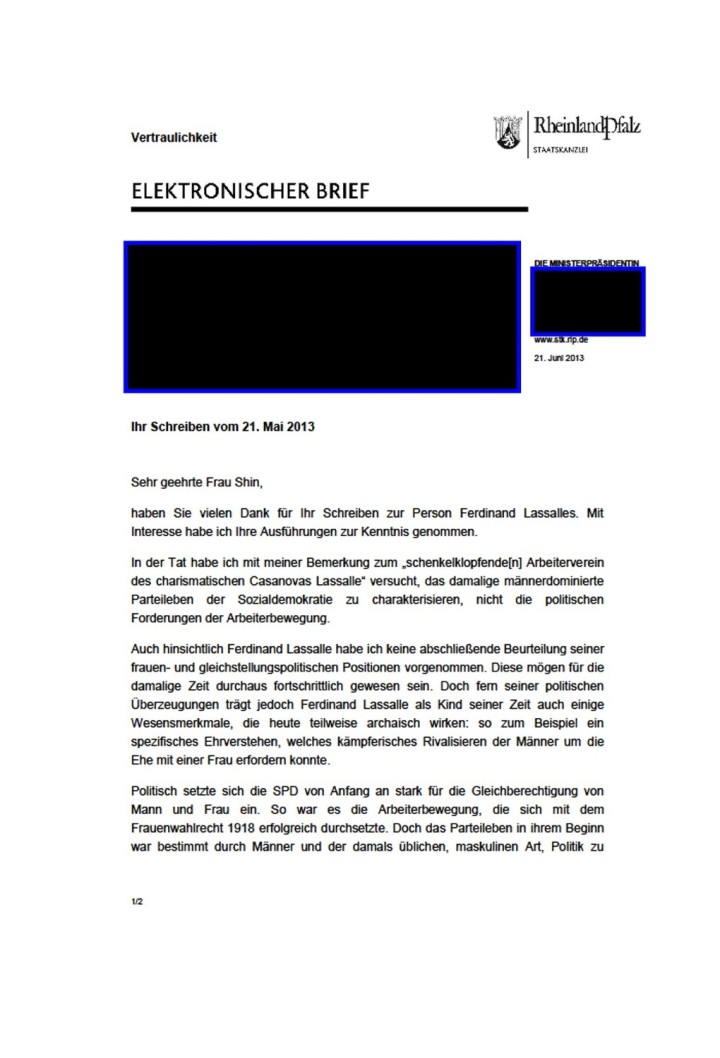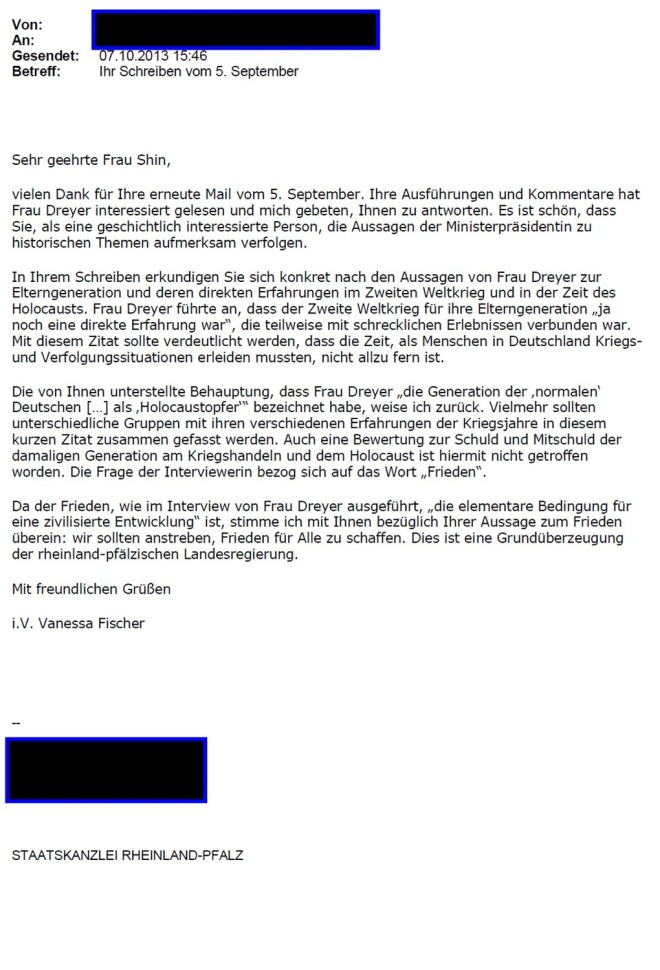
October 27, 2013: "I can read and write", Minister-President Malu Dreyer says
German newspaper “Welt” has reported on October 2nd about “embarrassing mail”: Malu Dreyer, Minister-President of the State of Rhineland-Palatinate, Germany, has sent a “letter full of mistakes” to Merkel. Government spokeswoman Monika Fuhr has called this incident a “clerical error” (in German: “Büroversehen”).
On October 27th Malu Dreyer has talked about her „embarrassing letter“ for the first time in public: During HR-Talk with Uwe Berndt Malu Dreyer said that the letter is “very embarrassing” and that she has “quite able staff”. She stressed: “I can read and write.” There had been an „absolutely impossible clerical error“, it had “just happened” und she “usually reads letter much more carefully”.
So Malu Dreyer admits that she has not paid attention. Then how can her mistake be a „clerical error“ ?
Malu Dreyer adds: “It is not normal that letters which are addressed to a certain person appear in newspapers – there is mail secrecy in Germany”.
I say: According to the German Penal Code mail secrecy is only violated if letters are opened without authorization. It is no crime to give a letter which already has been opened with authorization to newspapers. So the one who has given Dreyer’s letter to the WELT has committed no crime.
During the HR-Talk Mrs. Dreyer says: “I hate it when people talk of ,things without alternative’”. There is no way without alternative.” Already in January, she had told German newspaper FOCUS that she hates the following sentence: „This is without alternative.”
However, Mrs. Dreyer herself talks about missing alternatives. “Berliner Zeitung” quotes her and her husband Klaus Jensen, Mayor of Trier, in an article from July 8th saying: “With regard to demographic change, communal living is without alternative, both say (…).”
And the website of the government tells us that Mrs. Dreyer has called the new draft budget on October 2nd a “rigorous austerity budget”; she is quoted saying: “The cost-saving measures are very painful in some areas, but the one who criticizes that has to point out alternatives.” With other words: To Mrs. Dreyer, the “rigorous austerity budget” is without alternatives!
http://www.rlp.de/no_cache/einzelansicht/archive/2013/october/article/-9b92607918/
How embarrassing have actually been Mrs. Dreyer’s earlier letters and speeches? An – incomplete – retrospect.
February 26, 2013: "It was just understandable", says witness Dreyer at Nürburgring trial
On 26th February witness Malu Dreyer is heard by Landgericht (Regional Court) Koblenz during the Nürburgring trial. The accused is her former fellow Minister Professor Ingolf Deubel. Minister-President Dreyer says to the journalists with their microphones that Deubel had informed his colleagues on the upcoming Nürburgring project and that nobody had noticed anything wrong: "It was just understandable what Ingolf Deubel said at the time and in addition he always was a very competent colleague so that we did not have any doubt that his remarks are correct."
The link to the video:
May 21, 2013: Lassalle - to Mrs. Dreyer a "Casanova"
“Deutschlandfunk” reports on May 21st about a dictum of Malu Dreyer during the sesquicentennial celebration of the Social Democratic Party of Germany (SPD) in Mainz: Malu Dreyer is “glad that today SPD is not anymore the thigh-slapping workers’ association of charismatic Casanova Lassalle”.
An SPD-Minister-President calls SPD party founder Ferdinand Lassalle a “Casanova”, just when there is the sesquicentennial celebration? I write to Mrs. Dreyer, and I write to “Trierischer Volksfreund”, a regional newspaper.
May 28, 2013: Anything but Casanova - my letter to the editor
On October 28th “Trierischer Volksfreund” publishes my letter to the editor. The headline is “Anything but Casanova”.
My text:
Thank you for your report about the sesquicentennial of SPD in Mainz: By this celebration, at the historical site SPD has commemorated Ferdinand Lassalle, who called exactly 150 years ago, on 20th May 1863, in the “Frankfurter Hof”, for the founding of a workers’ association. This founding happened then three days later on 23rd May 1863, and the SPD was born. I am surprised to hear what Minister-President Malu Dreyer said on Lassalle: She is “glad that today SPD is not anymore the thigh-slapping General German Workers’ Association of charismatic Casanova Lassalle, who has lost his life in a duel for a woman”. However, Mrs. Dreyer is mistaken when she calls Lassalle a “Casanova”: Lassalle has always taken a stand for the self-determination of women, also in the particular case: Firstly, he has helped a woman to nullify her forced marriage. Secondly, he has protested against the fact that a woman of 21 could not marry a husband of her choice. There he has gone so far to fight a duel with the man whom the woman’s father had chosen for her. So Lassalle has not been a women’s deceiver, a “Casanova”, but – on the contrary – an advocate of women’s rights and a promoter of emancipation. In his letter to Arnold Mendelssohn from September 1845 Lassalle even calls Casanova a “frivolous subject” and stresses: “I am no Casanova”. On his memorial day, I would have expected more respect for this great German of Jewish descent.
http://www.volksfreund.de/nachrichten/kolumnen/leserbriefe/Leserbriefe-Parteien;art8042,3540212
June 21, 2013: Mrs. Dreyer's reply - "No final assessment" of Lassalle
Malu Dreyer replies to me on June 21st.
Her letter (my translation):
Dear Mrs. Shin,
Thank you very much for your letter about the person Ferdinand Lassalle. I have acknowledged with interest your deliberations.
In fact, with my remark of the “thigh-slapping workers’ association of charismatic Casanova Lassalle” I have tried to characterise the party life of Social Democrats at that time dominated by men, not the political demands of the workers’ movement.
With regard to Ferdinand Lassalle, too, I have made no final assessment of his positions concerning women and gender policies. These positions may have been at the time quite progressive. But away from his political beliefs, Ferdinand Lassalle, as child of his age, shows some characteristics which partly seem to be archaic today: for example a specific code of honour which could demand militant rivalry for a marriage with a woman.
Politically, from the beginning the SPD has taken a stand for gender equality. It has been the workers’ movement that 1918 successfully had its way with the women’s right to vote. However, party life in its beginning was dominated by men and their at the time usual masculine way of doing politics. This changed only over the decades. A merit of many women who formed the political culture of a party and of the whole society.
Best wishes
Malu Dreyer
June 23, 2013: The citizens' letter from the "open State Chancellery" - a secret letter?
Why is written on top of each side “confidentiality”? Shall I show this letter to nobody? Is this letter a “secret letter”? On 23rd June, I write again to Mrs. Dreyer.
My text:
Dear Minister-President,
Thank you very much for your reply from 21st June.
It is a pity that your letter is marked in the first line by the word “confidentiality”. I understand it this way that I may neither publish your letter nor show it to others.
You have started the discussion about Lassalle’s merits or mistakes on 20th May 2013 coram publico, in full public view, just at the Frankfurter Hof, at the place where Lassalle called for the founding of a workers’ party exactly 150 years ago. I have reacted to your speech with my email to you from 21st May and with my reader’s letter “Anything but Casanova!” which has been published by Trierischer Volksfreund on 29th May. My reader’s letter can also be found on the website of Trierischer Volksfreund:
http://www.volksfreund.de/nachrichten/kolumnen/leserbriefe/Leserbriefe-Parteien;art8042,3540212
It should be possible to continue in public the discussion you have once started in public, especially in the anniversary year of SPD which is at the same time a year of Lassalle. The question is whether Lassalle, a German of Jewish descent, can be an inspiring example to all of us or not.
In your governmental declaration you have said that politics have to become more “transparent”, “also and especially with the help of the new media”. You have said that Politics have a “Bringschuld”; politics have to “explain themselves, to make their intentions and decision-making bases more understandable and public, to remove barriers and to open themselves”. You also want to “make state action more transparent” and “facilitate political participation”. You want to “tie on the broad culture of dialogue in Rhineland-Palatinate”, but you even want “to take one more step”. Trierischer Volksfreund from 30th January quotes you saying that you offer an “open State Chancellery” in your governmental declaration. Hearing all these pledges to “political participation”, “transparency”, “publication”, “culture of dialogue” and “open State Chancellery” it surprises me and it appears strange to me that your repies to citizens’ letters shall be secret.
Of course, every sender, a politician as well, may demand of the receiver to keep the sent letters secret; but this requirement will be juridically void with regard to politicians’ replies. Therefore I think it is juridically misleading to mark such letters as “confidential” and above politically mistaken and in the particular case contradictory as well. To my mind politics have to be credible in the first place.
I ask you to answer my questions; then I will be glad to comment on the content of your letter from 21st July.
Link to the manuscript of Mrs. Dreyer's governmental declaration:
Link to the article of Trierischer Volksfreund from 30th January 2013:
July 4, 2013: No secret letter - but a "clerical error" of State Chancellery
On 4th July, I receive a reply from State Chancellery. An employee tells me that the confidentiality flag is part of the “internal form” and that unfortunately it has not been removed. A “clerical error” therefore, which will not remain the last one…
The text (my translation):
Dear Mrs. Shin,
Thank you very much for your Email, asking about the “confidentiality” flag. Minister-President Mrs. Dreyer has asked me to reply to you.
The confidentiality flag is part of the internal form which has been used to write the electronic letter and unfortunately it has not been removed accordingly in the letter to you. The Minister-President’s letter to you is a normal responding letter without any special rules of confidentiality.
My comment: Strange that Dreyer’s other letters which are not addressed to citizens (to her fellow politicians or staff, to other authorities, institutions or panels…) shall be secret while Mrs. Dreyer offers an “open State Chancellery”. The secret letter seems to be normal practice in the supposedly transparent State Chancellery (“internal form”).
July 19, 2013: Mrs. Dreyer's parent generation and its "suffering of holocaust"
On 19th July “DeutschlandradioKultur” broadcasts a radio piece from Mrs. Dreyer concerning “Peace”.
http://www.deutschlandradiokultur.de/friede.1730.de.html?dram:article_id=254670
Malu Dreyer says:
“To live in peace, is a great privilege to me which is always in danger.”
She goes on:
"For our parents, World War and Holocaust have still been a direct experience, partly from their own terrible experience or suffering."
Mrs. Dreyer's parent generation - a holocaust victim?
(Link to audio file:
Please go first to this site:
http://www.deutschlandradiokultur.de/arm.1730.de.html?dram:article_id=238252
Then in the audio menu at the bottom of the page, click "Friede".)
September 5, 2013: My answer (1) - Lassalle no scapegoat
I write an answer to Mrs. Dreyer. First of all I am concerned with Lassalle.
Dear Mrs. Dreyer,
Thank you once again very much for your responding letter from 21st June 2013 (…).
As already has been said in my first letter, Lassalle has been no “Casanova”; even Lassalle himself has forbidden himself that characterizing in a letter. Your letter does not repeat this accusation; now you even say that Lassalle’s “positions concerning women and gender policies may have been at the time quite progressive”. I am glad if Lassalle will not be called a “Casanova” in future, especially on his real “festive days”.
However, now you perceive “some characteristics” of Lassalle which “partly seem to be archaic today: for example a specific code of honour which could demand militant rivalry for a marriage with a woman”. Of course, Lassalle’s duel is a very sad story. I only want to stress that Helene von Dönniges, as she wrote, wanted to marry Lassalle; but her father Wilhelm von Dönniges arrested her due to these plans and abused her physically and psychologically (Gösta von Uexküll: Lassalle, Rowohlt 1979, p. 127).
Wilhelm von Dönniges called his daughter a “depraved slut” and by doing so insulted Lassalle, too, who challenged her father for a duel (loc. cit.). At this point, the father could have conceded, instead of promising his daughter to somebody else and determining this person to take part in the duel. Maybe the duel has been Lassalle’s only chance to enforce the marriage, which under current law nobody could prevent. But at the time women were treated as things, and from this Lassalle suffered like Helene. If one says that Lassalle should rather have gone without Helene, then one says that Lassalle should not have been fighting for Helene, as the only leverage of this desperate lover has apparently been the duel menace. The duel therefore does not show an “archaic characteristic” of Lassalle, but the timeless and always modern urge of lovers to be together in an, if one may put it like this, rather “archaic” world.
There is still the reproach in your speech that SPD has been “Lassalle’s thigh-slapping workers’ association”. These are really two reproaches at one time: The SPD as a troop of chauvinists and Lassalle as person responsible for this.
Let us have a look at the first reproach: Using your wording, how "masculine" have been SPD and its "party life"? You stress that SPD „from the very beginning has taken a stand for gender equality“. Then it should immediately suggest itself that the SPD men from the very start have not been such “chauvinists”, as you seemingly suppose; otherwise, the SPD party program should have looked very different. In your letter you do not speak any more – in contrast to your speech – of “thigh-slapping” at ancient SPD: Were there really thighs slapped, as in the beer tent? Or was there a rather serious and decent atmosphere at SPD? I assume rather the last. And it seems to me that SPD men can not be blamed for a „party life dominated by men“: At the time, clubs and associations acts prohibited women from joining an association (Cora Stephan, Der Spiegel 31/1989, S. 139), an additional “archaic” characteristic of society, not of Lassalle.
Or has Lassalle himself, as the second reproach says, been responsible for the „masculine party life“?
Cora Stephan writes: “Conductor and composer Hans von Bülow, the former Prussian Prime-Minister von Pfuel, editor of Kladderadatsch Dohm and publisher Franz Duncker as well asfemale poets and women’s rights activists Hedwig Dohm, Ludmilla Assing and Fanny Lewald” met in his salon. After Lassalle’s death in 1864, Stephan says, Lassalle’s early fellow campaigner Countess Hatzfeld fought to preserve his standing and to become Lassalle’s successor as president of the General German Workers’ Union; but she did not get this place. Lassalle therefore has stirred women to engage at SPD; he can not be blamed for the fact that Mrs. Hatzfeld could not come out on top.
To declare Lassalle as „super-chauvinist“, saying that after his death everything has become better, is nothing else than searching a scapegoat for archaic structures of society. Lassalle cannot be held responsible for these structure, as he always opposed them. Mrs. Nahles spoke at the federal conference of ASF of the „Union of Men SPD“, “even in the year 2010” and stressed: “We have to start with us.”
(http://www.asf.de/aktuelle_themen/andrea-nahles-mnnerverein-spd--bei-uns-mssen-wir-anfangen1)
The current structures of society are responsible for these shortcomings, not Lassalle who has died nearly 150 years ago.
September 5, 2013: My answer (2) - Parent generation no holocaust victim
Then I ask Mrs. Dreyer about her statement on holocaust:
On this occasion, I would like to ask you to explain another of your statements which I do not regard as less unproblematic: You said in a radio piece, broadcast by DeutschlandradioKultur on July 19th, the following sentence: "For our parents, World War and Holocaust have still been a direct experience, partly from their own terrible experience or suffering."
The artist Manfred Bockelmann, born 1943, calls his drawings of holocaust victims “work of shame”; it is the “shame regarding a parent generation that has been silence on holocaust”.
(www.heute.at/freizeit/kultur/art23668,878476)
And author Mrs. Kirsten Boie whom I also do not know in person has spoken in an interview of a “concealed entanglement of the parent generation with National Socialism and Holocaust”. She has said that the “discovery” of this entanglement has been the “core experience” of her generation.
Then I am surprised about the fact that you assess the role of the parent generation, as it seems to me, in a different way: You say that “our parents” (your parent generation) has not only “suffered” from World War, but also from Holocaust. You do not speak about a parent generation’s “entanglement” with Holocaust or at least about some “shame towards the parent generation”.
Your parent generation, that is the generation of “normal” Germans, who have lived after the war further in Germany and have got children there, cannot name themselves “holocaust victims”, not even “partly”. Your assertion that the parental generation has experienced holocaust, as well as World War, does not coincide with a more objective view. Your quote gives the impression that the parent generation, when it had to suffer during the War, has become victim in the same way as the ones killed in holocaust. It is only stressed that the parental generation has been the victim of World War; it could have been added that Nazi dictatorship has been the real root of this evil.
September 5, 2013: My answer (3) - Peace is no "privilege", no peculiar right of a small group
My last topic is Mrs. Dreyer’s statement that for her it is a “great privilege” “to live in peace”.
In the same radio piece you say the following words: „To live in peace, is form e a great privilege that is always in danger.“ This sentence may stand for “Realpolitik”. However, the UN Human Rights Council has decided on June 29th to elaborate a declaration on the right to peace.
Of course I hope that peace does not remain the “endangered privilege” of a certain group, but a basic right of every human being and know, dear Mrs. Dreyer, that you are with regard to this aspiration on my side.
October 7, 2013: A reply from Malu Dreyer's personal consultant
On 7th October, there is a reply from Malu Dreyer's personal consultant.
The text (my translation):
Dear Mrs. Shin,
Thank you very much for your further email from 5th September. Mrs. Dreyer has read your remarks and comments with interest; she has asked me to reply to you. It is nice that you, as a historically interested person, observe attentively the Minister-President’s statements regarding historic topics.
In your letter you ask concretely about the statements of Mrs. Dreyer regarding the parent generation and its direct experiences during World War and during the time of holocaust. Mrs. Dreyer said that for her parent generation Second World War was “still a direct experience”, which partly was connected with terrible experiences. By this statement it should have been pointed out that the time when people in Germany had to suffer from situations of war or persecution is not too far.
I reject the claim assumed by you that Mrs. Dreyer has called “the generation of ,normal’ Germans ,holocaust victims’”. Instead, different groups with their different experiences of war years should have been summarized in this short quotation. An evaluation of guilt and joint guilt regarding war action and holocaust has not been given. The question of the interviewer aimed at the word “peace”.
As peace is, as said by Mrs. Dreyer in the interview, “the elementary condition for a civilized development”, I agree with you regarding your remark about peace: we should strive to create peace for all. This is a basic conviction of the government of Rhineland-Palatinate.
Best regards
in representation: Vanessa Fischer
My comment
When Mrs. Dreyer mentions „our parents“, she can refer thereby only to her parent generation, the non-Jewish Germans. The reply says that “different groups with their different experiences should have been summarized”. How can one “summarize” here?
Volker Beck, Green politician, said at “Anne Will” TV talkshow in May last year, that the one who “only talks about Germans being victims”, “as if this has fallen from heaven”, denies the support of many Germans for Hitler and the inactivity of many other Germans. Therefore it has been my aspiration that Mrs. Dreyer does not just talk of the “terrible” suffering of Germans during World War, but that she also mentions the “entanglement” of many Germans with National Socialism as a cause to the War. It is correct that Mrs. Dreyer has said nothing in Deutschlandradio Kultur regarding this “entanglement” (the reply reads: “an evaluation of guilt and joint guilt regarding war action and holocaust has not been given”) – but this is exactly what I have criticized before.
Finally: When Mrs. Dreyer is asked by Deutschlandradio about the word “peace” and she says something about holocaust, she can not claim that she has only wanted to say something regarding peace, not regarding holocaust.
Mrs. Dreyer stresses in an unbalanced way the “victim’s fate” of her parent generation, the non-Jewish Germans, without saying a word about the “entanglement” of many members of this generation with National Socialism. Does Mrs. Dreyer want to move her parent generation in “the victims’ proximity” – and even in the proximity of holocaust victims? To Serdar Somuncu, guest as well in the Anne Will show, is the “trick to move oneself always in victims’ proximity” a “forbidden attempt of relativization” – the attempt to relativize and to downplay the holocaust by referring to the suffering of Germans during World War.
The link to „Anne Will“ show, 2nd Mai 2012, from 10.45 pm on:
https://www.youtube.com/watch?v=dMXvZn1TNIs
(Minutes 47 bis 57)
Marie Josenhans Institut
(Marie Josenhans, 1855-1926, deutsche Sozialarbeiterin und Sozialpolitikerin)
Projekte für die Öffentlichkeit.
Soonim SHIN
Magistra Artium (M. A.)
Staatlich anerkannte
Diplom-Sozialarbeiterin (FH)
Kaiser-Karl-Ring 6
D-55118 Mainz
Robertgasse 1
A-1020 Wien
Post senden Sie bitte
nur per Email
an:





